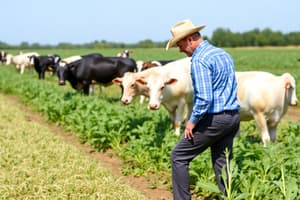Podcast
Questions and Answers
What is a key aspect of Risk Management Strategy in farm operations?
What is a key aspect of Risk Management Strategy in farm operations?
- Analyzing market trends and patterns
- Preparing financial statements
- Identifying and prioritizing potential risks (correct)
- Developing a production schedule
Which of the following is a goal of Supply Chain Optimization in farm operations?
Which of the following is a goal of Supply Chain Optimization in farm operations?
- Improving the quality of crops
- Reducing labor costs
- Reducing production costs
- Increasing customer satisfaction (correct)
What is a key consideration in determining the most profitable and sustainable production plan for a farm?
What is a key consideration in determining the most profitable and sustainable production plan for a farm?
- Soil health and fertility
- Government policies and regulations
- Availability of labor
- Market demand and prices (correct)
What is the primary purpose of Market Trend Analysis in farm operations?
What is the primary purpose of Market Trend Analysis in farm operations?
What is a key aspect of Financial Management in farm operations?
What is a key aspect of Financial Management in farm operations?
Which of the following is an example of a financial strategy in farm operations?
Which of the following is an example of a financial strategy in farm operations?
Flashcards are hidden until you start studying
Study Notes
Risk Management Strategy
- Identify, assess, and prioritize potential risks that could impact farm operations
- Develop strategies to mitigate or manage risks, such as:
- Insurance (e.g., crop insurance, livestock insurance)
- Diversification (e.g., multiple crops, livestock, and enterprises)
- Hedging (e.g., forward contracts, options)
- Enterprise selection and combination
- Implement risk management plans and monitor their effectiveness
Supply Chain Optimization
- Analyze and optimize the flow of goods, services, and information from farm to consumer
- Identify inefficiencies and areas for improvement in the supply chain
- Implement strategies to reduce costs, improve quality, and increase customer satisfaction, such as:
- Inventory management
- Logistics and transportation management
- Quality control and assurance
- Relationship building with suppliers and buyers
Production Planning
- Determine the most profitable and sustainable production plan for the farm
- Set production goals and objectives, considering factors such as:
- Resource availability (e.g., land, labor, equipment)
- Market demand and prices
- Climate and weather patterns
- Soil health and fertility
- Develop a production schedule and allocate resources accordingly
Market Trend Analysis
- Analyze market trends and patterns to inform farm business decisions
- Identify opportunities and threats in the market, including:
- Changes in demand and prices
- Shifts in consumer preferences
- Competitor analysis
- Government policies and regulations
- Use market data to adjust production plans and risk management strategies
Financial Management
- Manage farm finances to ensure profitability and sustainability
- Prepare and analyze financial statements, including:
- Balance sheet
- Income statement
- Cash flow statement
- Develop and implement financial strategies, such as:
- Budgeting and cost control
- Investment and financing decisions
- Tax planning and management
Risk Management Strategy
- Identify and prioritize potential risks that could impact farm operations
- Develop strategies to mitigate or manage risks, including insurance, diversification, and hedging
- Insurance options include crop insurance and livestock insurance
- Diversification strategies include growing multiple crops, raising multiple types of livestock, and diversifying enterprises
- Hedging strategies include using forward contracts and options
Supply Chain Optimization
- Analyze and optimize the flow of goods, services, and information from farm to consumer
- Identify inefficiencies and areas for improvement in the supply chain
- Implement strategies to reduce costs, improve quality, and increase customer satisfaction
- Inventory management strategies can help reduce costs and improve efficiency
- Effective logistics and transportation management can reduce transportation costs and improve delivery times
- Quality control and assurance strategies can help improve product quality and reduce waste
- Building strong relationships with suppliers and buyers can help improve communication and reduce costs
Production Planning
- Determine the most profitable and sustainable production plan for the farm
- Set production goals and objectives based on factors such as resource availability, market demand, and climate
- Consider resource availability, including land, labor, and equipment
- Analyze market demand and prices to inform production decisions
- Consider climate and weather patterns when planning production
- Soil health and fertility are important factors to consider when planning production
Market Trend Analysis
- Analyze market trends and patterns to inform farm business decisions
- Identify opportunities and threats in the market, including changes in demand and prices
- Analyze shifts in consumer preferences and competitor activity
- Consider government policies and regulations when analyzing market trends
- Use market data to adjust production plans and risk management strategies
Financial Management
- Manage farm finances to ensure profitability and sustainability
- Prepare and analyze financial statements, including balance sheets, income statements, and cash flow statements
- Develop and implement financial strategies, such as budgeting and cost control
- Make informed investment and financing decisions
- Implement tax planning and management strategies to minimize tax liability
Studying That Suits You
Use AI to generate personalized quizzes and flashcards to suit your learning preferences.




